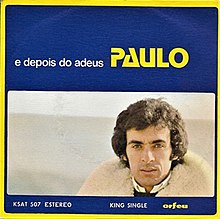| "E depois do adeus" | ||||
|---|---|---|---|---|
 | ||||
| Single by Paulo de Carvalho | ||||
| from the album Paulo | ||||
| Language | Portuguese | |||
| B-side | "Versão orquestral" | |||
| Released | 1974 | |||
| Genre | Ballad | |||
| Length | 3:18 | |||
| Label | Ofreu | |||
| Composer(s) | José Calvário | |||
| Lyricist(s) | José Niza | |||
| Producer(s) |
| |||
| Paulo de Carvalho singles chronology | ||||
| ||||
| Eurovision Song Contest 1974 entry | ||||
| Country | ||||
| Artist(s) | ||||
| Language | ||||
| Composer(s) | ||||
| Lyricist(s) | José Niza | |||
| Conductor | José Calvário | |||
| Finals performance | ||||
| Final result | 14th | |||
| Final points | 3 | |||
| Entry chronology | ||||
| ◄ "Tourada" (1973) | ||||
| "Madrugada" (1975) ► | ||||
"E depois do adeus" (English: "And After the Farewell") is a song recorded by Portuguese singer Paulo de Carvalho, with music composed by José Calvário and lyrics by José Niza. It represented Portugal in the Eurovision Song Contest 1974, held in Brighton, having previously won that year's Grande Prémio TV da Canção Portuguesa.
The song's airing on 24 April 1974 at 10:55 p.m. on Emissores Associados de Lisboa Radio Station was one of the two secret signals which alerted the rebel captains and soldiers to begin the Carnation Revolution.